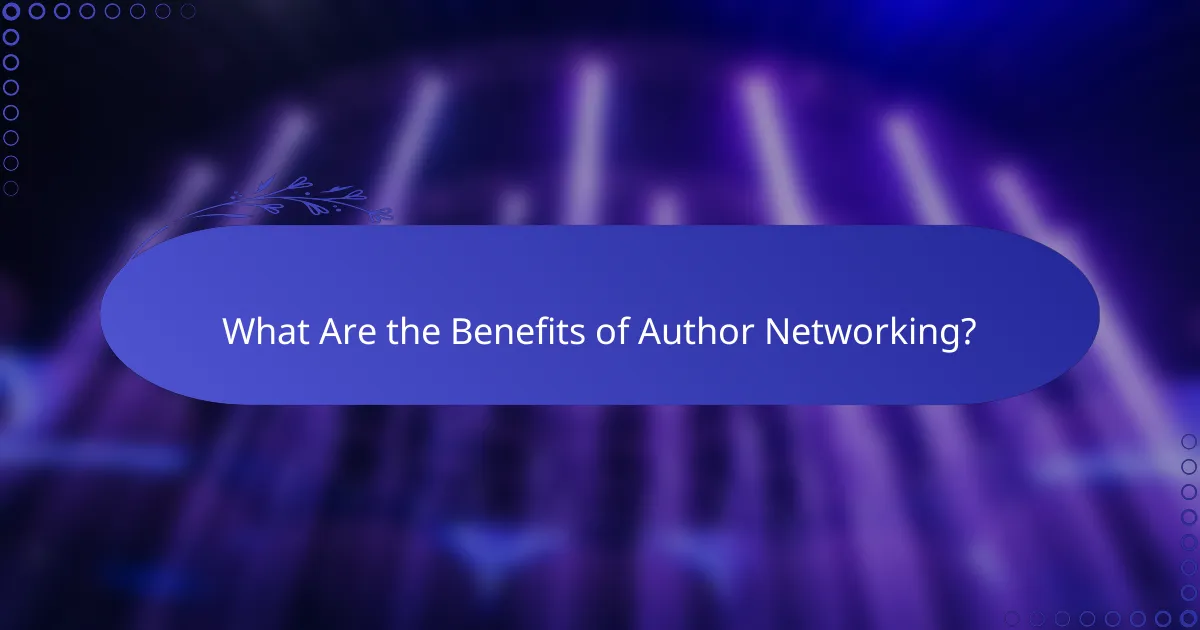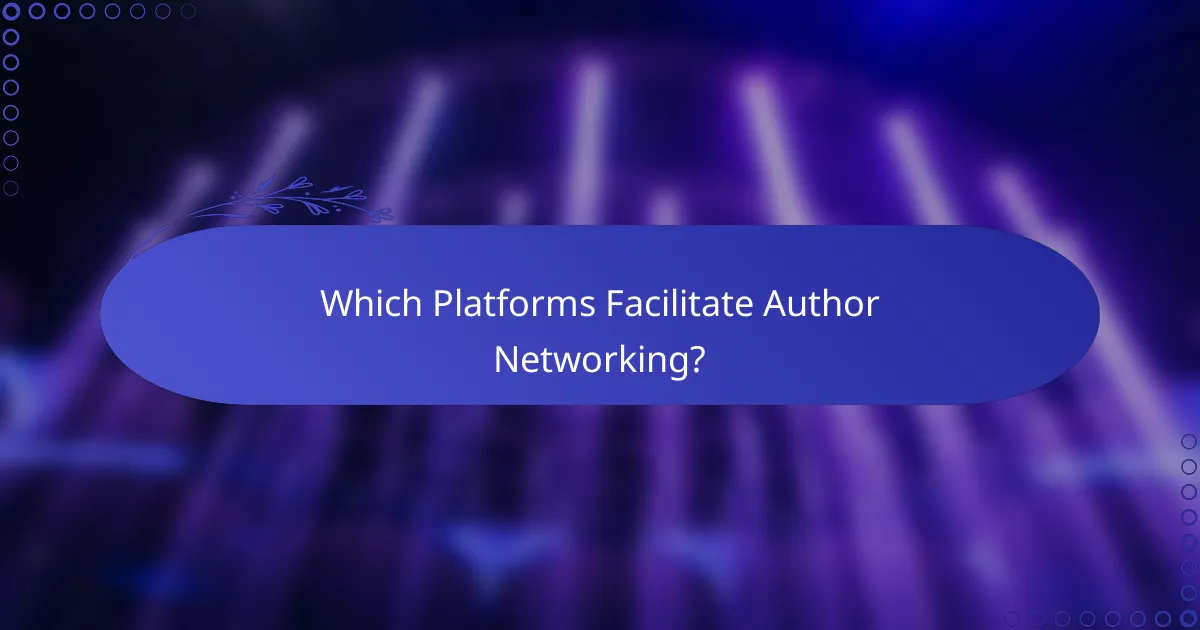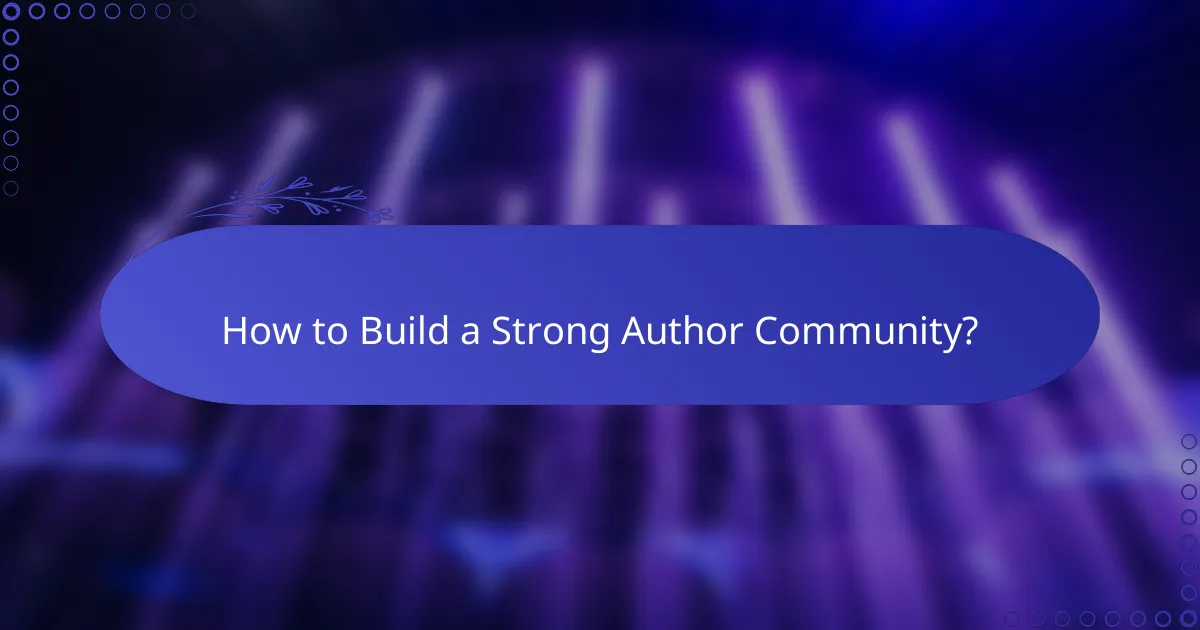Author networking is a powerful tool that enables writers to collaborate and enhance their visibility within the literary community. By engaging in joint projects and marketing efforts, authors can leverage each other’s strengths to reach diverse audiences and build credibility. Utilizing dedicated platforms for networking can further facilitate connections, resource sharing, and audience growth among authors.

How Can Authors Collaborate Effectively?
Authors can collaborate effectively by leveraging each other’s strengths and networks to enhance their visibility and reach. This involves engaging in various collaborative efforts that can lead to mutual benefits, such as co-authoring projects, joint marketing, and community engagement.
Co-authoring projects
Co-authoring projects allow authors to combine their expertise and creativity, resulting in richer content and broader appeal. When collaborating on a book or article, it’s essential to establish clear roles and responsibilities to avoid misunderstandings.
Consider setting up a timeline and regular check-ins to keep the project on track. This ensures that both authors remain aligned on goals and deadlines, which can lead to a more cohesive final product.
Joint marketing campaigns
Joint marketing campaigns enable authors to pool resources and reach a wider audience. By collaborating on promotional efforts, such as shared newsletters or social media posts, authors can increase their visibility without incurring significant costs.
It’s beneficial to identify complementary genres or themes when planning a joint campaign. For example, a romance author could partner with a mystery writer to create a unique promotional event that appeals to both fan bases.
Shared workshops and events
Hosting shared workshops and events can foster community engagement and provide valuable learning opportunities for both authors and their audiences. Authors can collaborate to organize writing workshops, book signings, or panel discussions that attract a larger crowd.
When planning these events, consider the logistics, such as venue selection and marketing strategies. Collaborating on the event’s promotion can help ensure a successful turnout and enhance the authors’ reputations within their communities.
Online forums and communities
Participating in online forums and communities allows authors to connect with peers and readers, fostering collaboration and support. Engaging in discussions on platforms like Goodreads or specialized writing forums can lead to valuable partnerships and insights.
Authors should actively contribute to these communities by sharing expertise and offering constructive feedback. This not only builds relationships but also enhances their visibility within the writing community.
Social media collaborations
Social media collaborations can significantly boost an author’s presence and engagement. By partnering with other authors for joint live sessions, giveaways, or cross-promotions, they can tap into each other’s audiences effectively.
It’s crucial to choose partners whose audience aligns with your own. This ensures that the collaboration feels authentic and resonates with both sets of followers, maximizing the impact of the effort.

What Are the Benefits of Author Networking?
Author networking offers numerous advantages, including increased brand visibility, access to diverse audiences, enhanced credibility, and opportunities for mentorship. By connecting with other authors and industry professionals, writers can expand their reach and strengthen their personal brand.
Increased brand visibility
Networking with fellow authors can significantly boost your brand visibility. By collaborating on projects, participating in joint events, or sharing each other’s work, you can tap into new audiences and increase your exposure.
Consider engaging in social media campaigns or co-hosting webinars. These activities can help you reach a broader audience and establish a recognizable presence in your niche.
Access to diverse audiences
Through author networking, you gain access to a variety of audiences that you may not reach on your own. Each author has their own followers and readers, and by collaborating, you can introduce your work to new demographics.
For example, if you co-author a book or contribute to a collective anthology, you can leverage the combined readership to enhance your visibility. This approach can lead to increased book sales and a stronger readership base.
Enhanced credibility and authority
Building connections with established authors can enhance your credibility and authority in the literary community. When you network with respected figures, their endorsement can lend weight to your work.
Participating in panels, workshops, or literary festivals alongside recognized authors can further solidify your reputation. Readers are more likely to trust and engage with authors who are associated with well-known peers.
Opportunities for mentorship
Networking opens doors to mentorship opportunities, allowing you to learn from experienced authors. A mentor can provide valuable insights into the writing process, publishing industry, and marketing strategies.
Seek out authors whose work you admire and approach them for guidance. Many are willing to share their experiences and advice, which can be instrumental in your growth as a writer.

Which Platforms Facilitate Author Networking?
Several platforms are designed to enhance author networking by providing spaces for collaboration, visibility, and community engagement. Utilizing these platforms effectively can help authors connect with peers, share resources, and expand their audience reach.
Goodreads groups
Goodreads groups offer a dedicated space for authors to engage with readers and fellow writers. These groups can focus on specific genres, writing techniques, or general discussions about literature.
To maximize your presence, actively participate in discussions, share your work, and provide feedback on others’ writing. Avoid spamming the group with promotional content; instead, focus on building relationships and contributing valuable insights.
Facebook author pages
Facebook author pages serve as a platform for authors to showcase their work, share updates, and interact with fans. These pages allow for direct communication and can help build a loyal following.
Regularly post engaging content such as writing tips, book trailers, or behind-the-scenes looks at your writing process. Consider using Facebook Live for Q&A sessions to foster community engagement and encourage interaction with your audience.
LinkedIn professional networks
LinkedIn is a powerful tool for authors looking to connect with industry professionals and other writers. It allows for networking with publishers, agents, and fellow authors, which can lead to collaboration opportunities.
Optimize your profile with a professional photo and a compelling summary of your writing achievements. Join relevant writing groups and participate in discussions to increase your visibility within the professional community.
Twitter writing communities
Twitter writing communities, often organized around specific hashtags, provide a fast-paced environment for authors to connect and share their work. Popular hashtags like #WritingCommunity or #AmWriting can help you find and engage with other writers.
Participate in writing prompts, share your progress, and support others by retweeting their work. Be mindful of Twitter’s character limit and focus on concise, impactful communication to capture attention and foster connections.

What Criteria Should Authors Consider for Collaboration?
Authors should evaluate several key criteria when considering collaboration opportunities, including audience demographics, genre compatibility, and shared goals. These factors can significantly impact the effectiveness and reach of collaborative efforts.
Shared audience demographics
Understanding shared audience demographics is crucial for successful collaborations. Authors should analyze their target readers’ age, interests, and reading habits to ensure alignment. For instance, if two authors write for young adult audiences, their collaboration is likely to resonate more with their combined readership.
To assess demographics, consider using tools like social media insights or reader surveys. This data can help identify overlapping interests and preferences, making it easier to tailor collaborative content that appeals to both audiences.
Complementary genres
Complementary genres can enhance the appeal of a collaboration by introducing readers to new styles while maintaining familiarity. Authors should look for genres that naturally blend, such as a romance author teaming up with a fantasy writer to create a romantic fantasy novel.
When choosing genres, consider how they can enrich the narrative without conflicting themes. Collaborating across genres can attract a broader audience, but it’s essential to ensure that the partnership feels cohesive and authentic.
Mutual goals and values
Having mutual goals and values is fundamental for a successful collaboration. Authors should discuss their objectives, whether it’s increasing visibility, reaching new audiences, or promoting a cause. Aligning on these goals ensures that both parties are invested in the project’s success.
Additionally, shared values, such as a commitment to quality or a focus on diversity, can strengthen the partnership. Authors should openly communicate their expectations and aspirations to create a collaborative environment that fosters creativity and mutual support.

How to Build a Strong Author Community?
Building a strong author community involves creating connections with fellow writers, fostering collaboration, and enhancing brand visibility. Engaging with others in the literary field can lead to valuable partnerships and a supportive network that benefits all members.
Regular meetups and events
Regular meetups and events provide authors with opportunities to connect face-to-face, share experiences, and discuss their work. These gatherings can range from informal coffee meetups to organized workshops and conferences, depending on the community’s size and focus.
Consider hosting monthly or quarterly events to maintain engagement. Look for local venues or online platforms that can accommodate your group size. Always promote these events through social media and local writing groups to attract a diverse audience.
Online support groups
Online support groups are essential for authors seeking feedback and encouragement from peers. These platforms allow writers to share their work, receive constructive criticism, and discuss challenges in a safe environment. Popular options include Facebook groups, Discord servers, and dedicated forums.
When creating or joining an online group, establish clear guidelines to ensure respectful and productive interactions. Regularly scheduled virtual meetings can help maintain momentum and foster deeper connections among members. Aim for a mix of experienced and novice writers to enrich discussions and learning opportunities.
